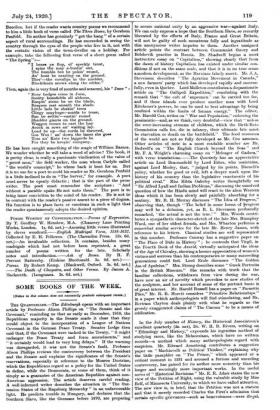SOME BOOKS OF THE WEEK.
[Nana in this column . does .not necessarily preclude subsequent revissa:3 THE QUARTERT.TF.S.—The Edinburgh opens with an important article by Professor Alison Phillips on "The Senate and the Covenant," reminding us that as, early as December, 1918, the Republican majority in the Senate made it clear that they would object to the incorporation of a League of Nations Covenant .in the German Peace. Treaty. Senator Lodge then said that, if the Covenant were tacked to the. Treaty, "it might endanger the Peace Treaty and force amendments," and "it certainly would lead to very long delays." If the warning' was disregarded,' it was not • the Senate's fault. Professor Alison Phillips reviews the controversy between the President and the Senate and explains the significance of the Senate's reservations, especially in reference to the Monroe Doctrine:i which the Republicans regard as a policy for the United States to define, while the Democrats, or some of . them, think of it simply as a guarantee of the American Republics against non-- American aggression. The article deserves careful reading. A . well-informed writer describes the situation in "The Sue. cession States of the Hapsburg Monarchy" in an unfavourable light. He predicts trouble in Hungary, and declares that the Southern Slaw,- like the Germans before 1870, are preparing to secure national unity by an aggressive war—against Italy. We can only express a hope that the Southern Slays, so recently liberated by the efforts of Italy, France and Great Britain, will not be guilty of such monstrous folly and ingratitude as this anonymous writer imputes to them. Another unsigned article points the contrast between Communist theory and Bolshevik practice in. Russia. Dr. Shadwell begins a most instructive essay on "Capitalism;' showing clearly that from the dawn of history Capitalism has existed under similar con- ditions if not on the same scale, and that it is in no true sense a modern development, as the Marxians falsely assert. Mr. J. A. Stevenson describes "The Agrarian Movement in Canada," a new farmers' party which has developed rapidly and success- fully, even in Quebec. Lord Midleton contributes a dispassionate article on "The Gallipoli Expedition," concluding with the remark that "the cult of ' supermen ' can be carried too far, and if these islands ever produce another man with Lord Kitchener's powers, he can be used to best advantage by being confined within the limits of human energy." The editor, Mr. Harold Cox, writes on" War and Population," enforcing the pessimistic—and, as we think, very doubtful—view that "unless the ever-increasing streams of children, which the Birth-Rate Commission calls for, die in infancy, their ultimate fate must be starvation or death on the battlefield." The food resources of the world are not so fully developed as Mr. Cox assumes. Other articles of note in a most readable number are Mr. Bedwell's on "The English Church beyond the Seas" and Mr. F. A. Wright's charming essay on "Meleager of Gadara," with verse translations.—The Quarterly has an appreciative article on Lord Beaconsfield by Lord Esher, who maintains, against Lord Morley, that, "judged by its points, Disraeli's policy, whether for good or evil, left a deeper mark upon the history of his country than the legislative enactments of his political rival." Miss Hilda Oakeley writes thoughtfully on "Sir Alfred Lyall and Indian Problems," discussing the unsolved question of how the Hindu mind will react to the alien Western ideas which it has been slowly and painfully absorbing for a century. Mr. R. H. Murray discusses "The Idea of Progress," observing that, though "The belief in some forms of Progress may well be a delusion, yet, as R. L. Stevenson profoundly remarked, 'the actual is not the true.'" Mrs. Woods contri- butes a sympathetic character-sketch of the late Mrs. Humpluy Ward, one of her oldest friends, and Mrs. Wharton performs a somewhat similar service for the late Mr. Henry James, with reference to his letters. Classical studies are well represented in this number. Professor Conway has a suggestive paper on "The Place of Dido in History " ; he contends that Virgil, in the Fourth Book of the Aeneid, virtually anticipated the ideas of the Age of Chivalry, showing a keener appreciation of women's virtues and sorrows than his contemporaries or many succeeding generations could feel. Lord Ernle discusses The Golden ABS of Apuleius." Mrs. Strong describes some " Greek Portraits in the British Museum." She remarks with truth that the familiar collections, withdrawn from view during the war, have now an air of novelty which provokes to new studies of the sculpture, and her account of some of the portrait busts is of great interest. Mr. Harold Russell has a paper on " Parasitie
Flies," Mr. R. R. Marett considers "Primitive Relationships" in a paper which anthropologists will find stimulating, and Mr.
Bertram Clayton deals plainly with what he regards as the grossly exaggerated claims of "The Cinema" to be a means of edification.


































 Previous page
Previous page